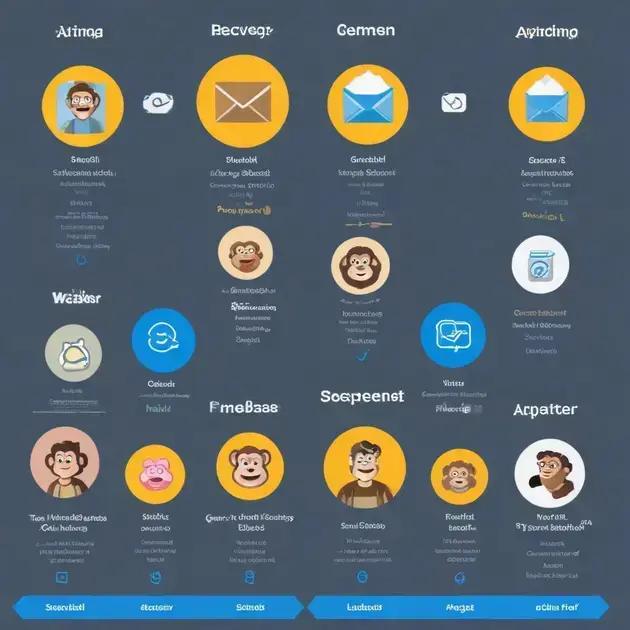The best email marketing tools enhance your campaigns through automation, personalization, and analytics. By choosing the right software that fits your goals and budget, you can effectively engage your audience and drive conversions in 2023.
In today’s digital landscape, best email marketing tools are essential for engaging your audience and driving conversions. The right software can transform bland outreach into vibrant, engaging campaigns that resonate with readers. Whether you’re a small business or part of a large corporation, finding the right platform can make all the difference in your marketing success.
Top Features to Look for in Email Marketing Tools
When selecting the best email marketing tools, there are several key features to consider that can enhance your campaigns and drive better results.
User-Friendly Interface
One of the most important features is a user-friendly interface. This ensures that even beginners can navigate the tool easily. Look for drag-and-drop functionalities and intuitive layouts that simplify the design of email campaigns.
Automation Capabilities
Automation is crucial for efficient email marketing. The best tools offer options to automate sending emails based on user actions, such as welcome emails for new subscribers or follow-ups for abandoned carts. This saves time and increases engagement.
Analytics and Reporting
Analytics is another vital aspect. Strong email marketing tools provide detailed reports on open rates, click rates, and user engagement. This data helps you understand what strategies work best and optimize future campaigns.
Responsive Design Templates
Choosing tools with pre-designed, responsive templates is essential. These templates automatically adjust to fit various screen sizes, ensuring your emails look great on both desktops and mobile devices.
Integration with Other Tools
Lastly, ensure that the email marketing tool can integrate seamlessly with other software you use, like Customer Relationship Management (CRM) systems and e-commerce platforms. This connectivity streamlines your marketing efforts and maintains consistency across channels.
Comparing the Best Email Marketing Tools

When it comes to choosing the best email marketing tools, comparing their features and functionalities is essential. Here we will look at some popular tools on the market today.
Mailchimp
Mailchimp is widely regarded for its user-friendly interface and powerful features. It offers a variety of customizable templates and advanced analytics to track campaign performance. Additionally, its automation features help users set up drip campaigns easily.
Constant Contact
Constant Contact excels in email customization and offers a wide selection of templates. It also provides excellent customer support, ensuring users can get help when needed. With its social media integration, you can easily promote your email campaigns across different platforms.
SendinBlue
SendinBlue stands out for its email marketing and SMS marketing capabilities. It offers a robust automation suite and detailed reporting. Its pricing structure is flexible, making it an attractive choice for businesses of all sizes.
AWeber
AWeber is known for its simplicity and effectiveness. It includes useful features like drag-and-drop email creation and autoresponders. AWeber’s reliability and extensive library of resources also provide great value to users looking to improve their email marketing.
GetResponse
GetResponse combines email marketing with powerful landing page features. It allows users to create effective landing pages directly linked to their email campaigns, enhancing conversion rates. Its automation features are also highly regarded in the industry.
Benefits of Using Email Marketing Software
Using email marketing software offers numerous benefits for businesses aiming to enhance their marketing strategies. Here we explore some key advantages that such tools provide.
Cost-Effective Marketing
Email marketing is often more affordable than other forms of advertising. With software, businesses can reach a vast audience with minimal cost, making it an ideal option for small to medium-sized enterprises.
Targeted Campaigns
With advanced segmentation options, email marketing software allows businesses to create targeted campaigns. By categorizing subscribers based on their preferences and behavior, companies can send personalized messages that resonate better, resulting in higher engagement rates.
Increased Engagement
Email marketing tools enable businesses to engage with their audience effectively. Features like A/B testing help optimize email content for better open rates and click-through rates. Engaging content drives customer interaction and builds stronger relationships.
Automation of Tasks
Automation is one of the most significant advantages of using email marketing software. Businesses can set up automated responses for new subscribers, follow-ups, and reminders, saving time and resources while ensuring timely communication with customers.
Analytics and Insights
Email marketing software provides valuable analytics and insights. Businesses can track metrics such as open rates, click rates, and conversion rates. These insights allow companies to adjust their strategies based on performance, leading to improved campaign outcomes.
How to Choose Email Marketing Tools That Fit Your Needs

Choosing the right email marketing tools that fit your needs can significantly impact your campaign’s success. Here’s how to approach this important decision.
Assess Your Goals
Start by clearly defining your email marketing goals. Are you looking to build brand awareness, drive sales, or increase customer engagement? Different tools specialize in various areas, so knowing your objectives helps narrow down your options.
Evaluate Your Budget
Consider how much you are willing to spend on email marketing software. Some tools offer free versions with limited features, while others provide comprehensive services at a higher cost. Determine what features are essential for your business and what fits your budget.
Examine Features
Look for essential features such as automation, segmentation, customizable templates, and analytics. Make a list of must-have features and compare them across different tools. This ensures that you choose a tool that will support your marketing strategies effectively.
Check for Integration
Ensure the email marketing tool can integrate with other software you use. For instance, it should work well with your Customer Relationship Management (CRM) system, e-commerce platform, and other marketing solutions. This integration promotes a seamless workflow and data flow.
Read User Reviews
Before making a decision, read reviews and testimonials from other users. Their experiences can provide valuable insights into the software’s reliability, customer support, and ease of use. Look for tools with positive feedback and a strong support team to assist with any issues.
Trends in Email Marketing Tools for 2023
Staying updated with the latest trends in email marketing tools is essential for success in your campaigns. In 2023, several trends are shaping how businesses approach email marketing.
AI and Personalization
Artificial Intelligence (AI) is playing a significant role in email marketing. AI-driven tools help businesses analyze customer behavior, enabling hyper-personalization of emails. This means content can be tailored to individual preferences, boosting engagement and conversion rates.
Interactive Emails
Interactive emails are gaining popularity. These emails include elements like polls, quizzes, and sliders, making them more engaging. Content that encourages interaction invites subscribers to participate actively, leading to increased user involvement.
Mobile Optimization
With more users checking emails on their mobile devices, optimizing email designs for mobile is crucial. In 2023, businesses are focusing on creating responsive designs that ensure a seamless experience across all devices, enhancing readability and engagement.
Emphasis on Privacy and Compliance
Privacy concerns are more prominent than ever. Email marketing tools are implementing features that help users comply with regulations such as GDPR and CCPA. Ensuring data protection and transparency in communications builds trust with subscribers and customers.
Automation and Advanced Analytics
Automation continues to be a crucial trend in 2023. Many tools now offer advanced automation options for campaigns, such as triggered emails based on user behavior. Additionally, comprehensive analytics allow marketers to measure the success of their campaigns in real-time, leading to informed decision-making.
Wrapping Up: Choosing the Right Email Marketing Tools
In conclusion, finding the right email marketing tools is crucial for success in your marketing efforts. By understanding your goals, evaluating your budget, and examining the features you need, you can make informed decisions.
Staying updated with trends such as AI integration, interactive content, and mobile optimization will enhance your campaigns and connect you with your audience effectively. Remember to focus on automation options and analytics for better performance tracking.
With the right tools and strategies, you can boost engagement, build stronger customer relationships, and achieve your marketing objectives.
FAQ – Frequently Asked Questions about Email Marketing Tools
What are the key benefits of email marketing tools?
Email marketing tools help automate campaigns, provide analytics for measuring success, and allow for targeted messaging to engage specific audience segments.
How can I choose the right email marketing tool for my business?
Start by assessing your marketing goals, budget, and the features you need, such as automation, customization options, and integrations with other platforms.
Why is mobile optimization important in email marketing?
Mobile optimization ensures that emails are easily readable and visually appealing on mobile devices, which is where many users access their email today.
How can I segment my email list for targeted campaigns?
You can segment your email list based on factors like customer behavior, demographics, and purchasing history to send personalized messages that resonate with specific groups.
What role does AI play in email marketing?
AI helps with personalization, analyzing customer data to tailor email content and optimizing send times, improving engagement and response rates.
What is the significance of analytics in email marketing?
Analytics provide insights into campaign performance, including open rates and click-through rates, allowing marketers to refine their strategies for better results.




